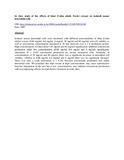| dc.description.abstract | Isolated mouse interstitial cells were incubated with different concentrations of khat (Catha edulis) extract (0.06 mg/ml, 0.6 mg/ml, 6 mg/ml, 30 mg/ml and 60 mg/ml) and cell viability as well as testosterone concentration measured at 30 min intervals over a 3 h incubation period. High concentrations of khat extract (30 mg/ml and 60 mg/ml) significantly inhibited testosterone production while low concentrations (0.06 mg/ml,
0.6 mg/ml and 6 mg/ml) significantly stimulated (P < 0.05) testosterone production by mouse interstitial cells. Similarly, at concentrations of 30 mg/ml and 60 mg/ml, there was a significant decrease in interstitial cell viability, whereas at 0.06 mg/ml, 0.6 mg/ml and 6 mg/ml there was no significant decrease. There was only a weak correlation (r = 0.39) between testosterone production and viable interstitial cells. We postulate that khat extract at high concentrations may cause reproductive function impairment in the user but at low concentrations, may enhance testosterone production with accompanying effects on reproductive functions in male mice. | en |

